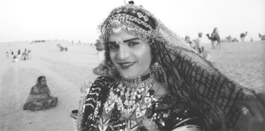home | north bay bohemian index | movies | current reviews | film review

On the road: A Harish dancer with the group Maharaja epitomizes the Romany's vast diaspora.
Do as the Romany
'Gypsy Caravan' follows the fortunes of five remarkable bands
By Richard von Busack
Try imagining American pop music without the influence of Africa. It's just that hard to imagine what European music would sound like without what the Romany have given it, in everything from lullabies to Liszt. Popularly called Gypsies, the Romany brought the sounds of Asia to Europe during their thousand-year journey. Gypsy Caravan by Jasmine Dellal is a world-music documentary par excellence, done in the best Les Blank manner. The emphasis on the musicians' home lives, families and culture matches the exhilarating onstage performances.
Dellal and her colleagues (including Albert Maysles) shoot five bands as they travel together on a six-week tour across North America, fluidly flashing back to the performers' offstage lives. Renowned musicians in their own lands, the bands have certain slight artistic tensions as they travel by bus. As Romany, says one musician, they have "rhythm, language and feeling" in common. The singer Juana la del Pipa describes Romany music in Spanish as possessing duende, something like charisma; hear it, she says and "tengo frio," you get a chill. Despite shared heritage, the musicians don't jam with each other easily at first; Gypsy Caravan notes that they can all most easily play with the band Maharaja, satin-costumed Rajasthanis who play the most ancient music of the Romany.
Dellal demonstrates the vastness of the musical diaspora of the Romany. The Balkan brass band Fanfare Ciocarlia sound a little like the Delhi wedding orchestra played during the titles in Monsoon Wedding, possible evidence of Indian roots. But the musicians here note that they also were influenced by the Turkish martial music that fanfare bands were made to perform for the occupying Ottoman soldiers. When the incredible fusion band Taraf de Ha´douks ("Band of Brigands") perform, some of their tunes sound like the Hot Club of Bucharest.
Gypsy Caravan ought to whip up more popularity for vocalist Esma Redzepova, the Macedonian daughter of a crippled shoeshine man. Called, without fear of contradiction, the Queen of the Gypsies, Esma is a regal, full-sized woman who declares herself the mother of more than 40 adopted children. Representing the other end of Europe, Esma's fellow caravaner is Juana la del Pipa of Andalusia, a rugged, throbbing-voiced flamenco singer. Tia Juana is candid about how drugs almost wrecked her family.
Perhaps most fascinating is since-deceased Romanian countryman Nicolae Neacsu of Taraf de Ha´douks, the kind of person even Johnny Depp (interviewed here) revered. This white-hot septuagenarian fiddler demonstrates the art of playing a violin with one hair of a bow.
Naturally, Dellal's film will be compared with Tony Gatlif's Latcho Drom. That film followed the Romany from the Asia to the Atlantic, showing us how the vocal ornamentation of Indian singing became the arabesques of flamenco. Gypsy Caravan is even more pleasurable; we feel we get to know the performers and began to search for their faces in a crowd as they spill out into an auditorium or a motel room. Gypsy Caravan does something that's hard to do today: it not only exposes unheard ethnic music, but it also opens up the world of Romany musicians who are especially (and justly) nervous of outsiders. The Romany here are everything the world thinks they aren't: hard-working and home-loving.
![]() 'Gypsy Caravan' screens at the Smith Rafael Film Center, 1118 Fourth St., San Rafael. 415.454.1222.
'Gypsy Caravan' screens at the Smith Rafael Film Center, 1118 Fourth St., San Rafael. 415.454.1222.
Send a letter to the editor about this story.
|
|
|
|
|
|